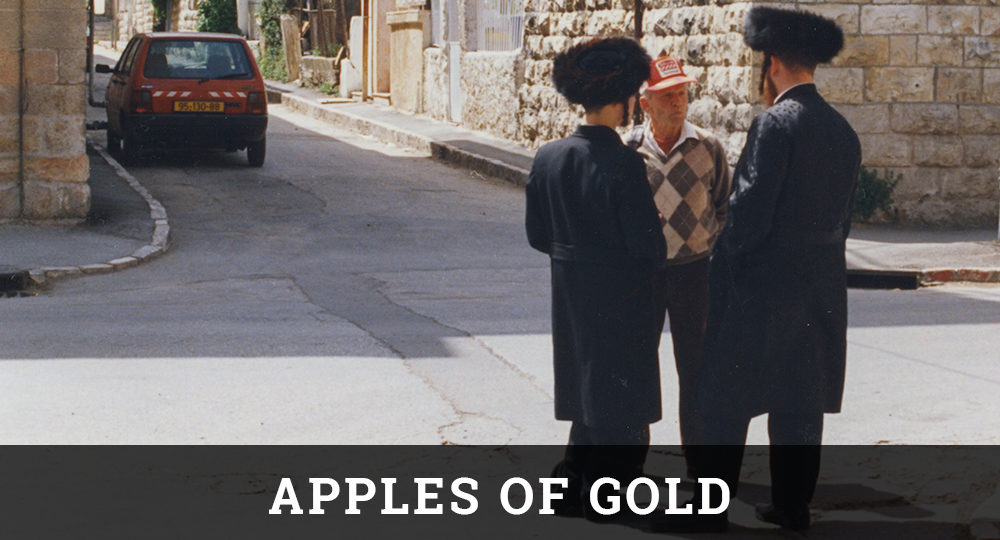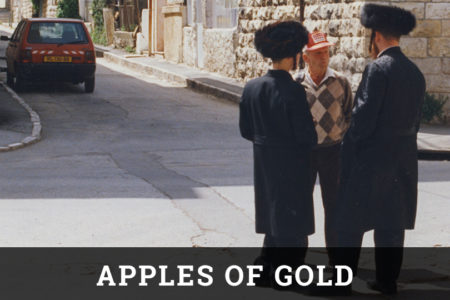Joel of Jerusalem
I recently visited the ultra-orthodox section of Jerusalem, and whenever I go there I always begin the conversation by talking about anything and everything because this is the way to gain their attention and friendship. It is also helpful to speak in their language, Yiddish, because this gives them a feeling of trust.
I entered a yeshiva I have visited before, a school where Jewish men study the Talmud and other books of commentary all their lives. But occasionally they take some time to “be happy,” so these men informed me, time to “rejoice and take a little wine.” They get their authority to do this from Psalm 104:15, “wine … maketh glad the heart of man.” On this particular visit, however, the men seemed a little too happy, and some of them could not even stand on their feet. I asked, “How can you profess to worship God and follow His commandments when you are so drunk?” One of them said, “That is a good question, and I will be glad to answer it. One who is drunk cannot commit sin because he is unconscious. A drunken man is free from sin!” I told him, “That may sound like a good answer, but when you drown yourselves in the bottle, you are convicting yourselves and you know that as well as I do. You are aware of what you are doing, and you know it is against the will of God. You have named your yeshiva ‘Everlasting Life,’ and you have written that name in big letters over the door so that it can be seen from far away, but if I were to give this place a name, I would write in big letters ‘Vain Life’ or ‘Inactive Life.’”
These men seemed to ignore my remarks and asked if I would like a glass of wine so that I could share in their joy. I refused, saying “I am happy without the bottle because I know in whom I have believed.” Again they said, “Come, let us lift the cup and be happy.” Then they sang with strong voices, a song taken from another Psalm, “The voice of rejoicing and salvation is in the tabernacles of the righteous” (Ps. 118:15). Again and again they urged me to have a drink, saying that I would then be able to join them in this joyful song. But I replied, “There is another song two chapters before the one you are singing and it says, ‘I will take the cup of salvation, and call upon the name of the Lᴏʀᴅ’ (Ps. 116:13). I will drink-in full consciousness, not like you. You say, ‘Let us drink and eat, for tomorrow we die.’”
One of the men then asked, “Is that not true? Surely we shall die.” “Yes,” I replied, “that is a fact, but death is not the end. Unfortunately, it appears that you do not believe in everlasting life, even though it is broadcast in big letters outside your school. I believe that to have everlasting life we must be ready at all times to meet God. This you cannot do if you are under the influence of alcohol.” The man then asked, “What is better, to be drunk or to be bitter all the time? When we drink wine we forget the things that have happened-to us and our forefathers over the centuries, and for a little while we can lay aside our bitterness.” I said, “You can see that I am much happier than you, and I don’t have to drink to be this way. I am happy because I have put my faith in the Lord.”
By this time they were feeling somewhat uncomfortable with my reprimands about their drinking, and so they changed the subject and said, “You speak about faith, but you do not look like one who believes in God. Where are your black clothes, your beard, your side curls, and your hat? You look like any ordinary person we would see walking the street. Explain how you can talk about faith in God and call yourself religious, as we are.” I told them, “First, I want you to know that I never run away from people just because they do not think as I do. God wants to bring all people to Himself, but we must be willing to follow Him. If we do, then we will be proud to write, in big letters, ‘Everlasting Life’ over our hearts. This is not what I alone say; it is written in the Psalms—Psalm 23, which was written by our greatest king David. I am sure you are familiar with that Psalm.”
Some of them were listening very carefully, but they could not accept all that I was saying and they could not understand how a person like me could presume to tell them how to worship God. One of the men asked, “Are you a Jew?” I replied, “Yes I am, but I believe in the Lord, not by what the old stories of the rabbis say, but through the Bible, according to the Holy Spirit of God.” At this he said, “That is enough! Now we know who you really are. You are a Christian because a Jew would never speak about the Holy Spirit.”
I said, “I am glad you mentioned that. I can show you examples in the Old Testament where the Holy Spirit is mentioned.” I then opened my Bible and read Zechariah 4:6, “Not by might, nor by power, but by my Spirit, saith the LORD of hosts,” and Psalm 51:11, “Cast me not away from thy presence, and take not thy holy Spirit from me.” “I am sure you realize that Zechariah and King David were not Christians.” They again ignored my remarks and said, “So it is true, you are a Christian!” I replied, “I am a real Jew, one who believes in God in the way He has prescribed in our own Jewish Scriptures. I also accept what is written in Isaiah 53, and I will be glad to read it to you right now, if you would like.” Since this is a forbidden chapter to the Jewish people, they did not want me to read it, but they were interested in knowing something of its contents, and I was very happy to relate it to them. I finished by saying “It is true, we have all, like sheep, gone astray; we have all gone on our own way, and the Lord has laid on Him, our Messiah, the iniquities of us all.”
When I left the yeshiva, I knew that these men had listened with their ears, but I also knew that they did not believe in their hearts. That was made even more evident a few days later when I received a letter from the yeshiva containing some very vulgar language. But, as we say, a curse cannot rest where a blessing has been pronounced.
Please pray with me that these men will consider what I told them that day. Pray that they will realize that they can be happy without drowning their bitterness in alcohol and that they will turn to the Lord, who alone can give the everlasting life they so desperately desire.







